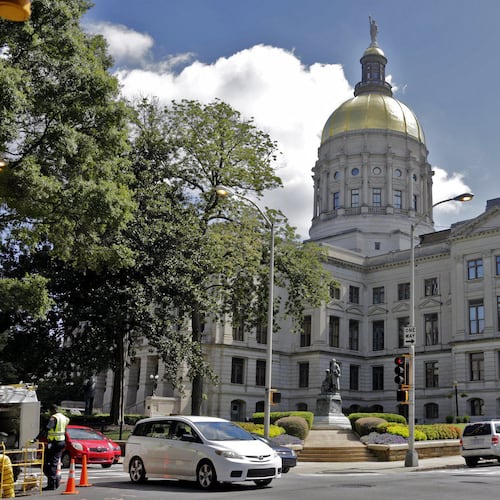President Donald Trump’s “big, beautiful bill” will have ripple effects across Georgia for years to come.
But a bipartisan group of state legislators said any adjustments that need to be made to the state budget can wait until January, when they come back in regular session. And staff for Gov. Brian Kemp, who has the authority to call a special legislative session, said he is unlikely to request one for the bill or to address possible economic impacts of Trump’s tariffs.
“For many, many decades, we’ve said that the federal government needs to live within its means, so it’s not a surprise that that’s finally happening,” Senate Appropriations Chair Blake Tillery, R-Vidalia, said. “Georgia is in a better position to handle this because of the decisions made by current and previous governors to not overextend ourselves.”
Republicans, who control the Legislature, are largely happy with the bill and back Trump’s domestic agenda.
“Congress just delivered the largest tax cut in our nation’s history, strategic investments to strengthen our border and national security, and historic cuts of waste, fraud and abuse in the federal government — all promises that President Trump was elected to fulfill on behalf of the American people,” said Georgia House Speaker Jon Burns.
The massive tax and spending package includes more money for immigration enforcement and national defense, plus an extension of tax cuts and the creation of new ones, which economists say will mostly benefit wealthy Americans. The bill, which passed along party lines, also reduces spending on federal programs like Medicaid and food assistance.
House Appropriations Chair Matt Hatchett said he met with some Congressional representatives during the legislative session about the reconciliation bill.
“My only request to them was please allow us some time to implement any changes that y’all may do. And they said that was a fair request,” he said.
With less federal money available for certain health services, Georgia will have to make decisions about whether to supplement the cuts with state money or reduce the number of people eligible for the programs.
However, because the federal budget year begins Oct. 1, lawmakers said they have time to study the nearly 900-page bill and prepare. Other aspects of the bill, such as a federal requirement that most Medicaid recipients work to receive benefits, won’t be phased in for a few years — giving legislators a chance to evaluate and adjust.
And Georgia’s $15 billion emergency fund put the state in a decent position to absorb any ripple effects, state officials and budget analysts said.
On Tuesday, the Georgia Federation of Teachers also requested Kemp convene a special session. The U.S. Congress in March approved $45 billion in spending nationwide to schools. However, the U.S. Office of Management and Budget has paused $7 billion of those funds, $200 million of which was earmarked for Georgia, to conduct a “programmatic review.”
The money funds after-school programs, English-as-a-second-language classes and other uses. The OMB accused some districts of misusing money “to subsidize a radical leftwing agenda.” With school starting again in just a few weeks, the Georgia Federation of Teachers requested that the state use some of its emergency funds to fill the gap.
That is unlikely to happen, and some districts, like Fulton County, plan to scale back their programs.
Georgia will likely lose about $10 billion in Medicaid funding over the next 10 years, according to the health research organization KFF. The state will also have to take on greater cost-sharing for the Supplemental Nutrition Assistance Program, also known as SNAP or food stamps, which helps low-income families pay for groceries.
“There’s just no way we can backfill all the federal funds that may even get cut down the line in the future, but we’ll do what we can,” Hatchett said.
He said he is “definitely watching” changes to SNAP. “That could be a lot of money the state has to find,” he said.
After previously calling for a special session in May, Senate Democratic Leader Harold Jones said this week that Kemp should be “seriously considering” a session.
“I would hope that if it’s needed, that we don’t allow politics to (take over),” he said. “The governor should probably give a little bit more of a statement and say whether he believes the state needs a special session, because now the bill is passed, it’s not speculation anymore.”
Jones’ counterpart in the Georgia House, Democratic Leader Carolyn Hugley, finds the federal budget bill deeply concerning for “everyday people.”
“We need to be very aware of what is going on (in this bill),” Hugley said.
But, she said ongoing work at the Capitol presents another problem. “If we call for a special session, where will we go?” she said.
The Capitol is undergoing a $400 million renovation that has gutted the chambers.
Another barrier to calling a special session is political. State law prohibits members of the General Assembly from raising campaign money while they are in session.
Danny Kanso, a senior fiscal analyst at the left-leaning Georgia Budget and Policy Institute, said the state outpaced revenue estimates for the 2025 fiscal year that just ended. Coupled with the large amount of money in reserves, he said it’s unlikely lawmakers would need to rush to make any changes to the state budget before they reconvene in January.
“I don’t think that there is a budgetary reason that would compel the state to have a special session,” he said.
Still, Kanso said, the state needs to examine how the federal spending bill will impact future state budgets.
“I don’t want to underplay the severity and long-term implications,” he said. “Really, as we look at this bill, we need to be thinking in terms of the next decade, rather than the next fiscal year.”
Staff Reporter Martha Dalton contributed to this report.
Keep Reading
The Latest
Featured





